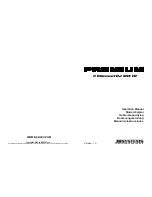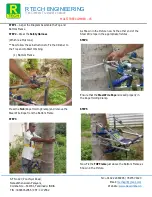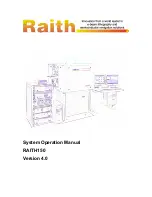
2
!
This is the safety alert symbol. It is used to alert you to potential personal injury hazards. Obey all safety messages that
follow this symbol to avoid possible injury or death.
• Study, understand, and follow all
instructions provided with and on this
device before use.
• All WARNING statements must be
carefully observed to help prevent
personal injury.
•
No alteration shall be made to this
device.
• Always wear protective gear when
operating hydraulic equipment.
• Keep hydraulic equipment away from
flames and heat. Hydraulic fluid can
ignite and burn. Do not operate if
leaks are detected.
•
Crush Hazard.
Keep hands and
feet away from loading area. Avoid
pinch points or crush points that can
be created by the load or parts of
cylinder.
•
To avoid crushing and related injuries:
NEVER work on, under or around
a lifted load before it is properly
supported by appropriate mechanical
means. Never rely on hydraulic
pressure alone to support load.
HYDRAULIC CYLINDERS
• The user must be a qualified operator familiar with the
correct operation, maintenance, and use of cylinders. Lack of
knowledge in any of these areas can lead to personal injury.
• Do not exceed rated capacity of the cylinder or any equipment
in the system.
• Burst hazard exists if hose or connection pressure exceeds
rated pressure.
•
Inspect cylinder, hoses and connections before each use to
prevent unsafe conditions from developing. Do not use if
they are damaged, altered or in poor condition. Do not use a
cylinder with bent or damaged coupler or damaged threads.
•
Use gauge or other load measuring instrument to verify load.
• Do not subject the cylinder to shock loads.
• Never attempt to disconnect hydraulic connections under
pressure.
• Use only approved accessories and approved hydraulic fluid.
•
Never attach ANY component not authorized by manufacturer.
• Never use other than factory provided and/or authorized
fasteners.
• Under certain conditions, the use of an extension with a
hydraulic cylinder may not be advisable and could present
a dangerous condition.
• Cylinder must be on a stable base which is able to support
the load while pushing or lifting. Ensure cylinder is fully
engaged into/onto adapters, extension accessories.
• Use shims, friction material or constraints to prevent slippage
of the base or load.
• Distribute the load evenly across
the entire saddle surface. Do not
off-center loads on a cylinder.
The load can tip or the cylinder
can “kick out”.
• This device is not suitable for use as support device! As the
load is lifted, use blocking and cribbing to guard against a
falling load.
• All personnel must be clear before lowering.
• Never try to disassemble a hydraulic cylinder, refer repairs
to qualified, authorized personnel.
HYDRAULIC HOSES & FLUID TRANSMISSION LINES
• Avoid short runs of straight line tubing. Straight line runs
do not provide for expansion and contraction due to
pressure and/or temperature changes.
• Reduce stress in tube lines. Long tubing runs should be
supported by brackets or clips. Before operating the pump,
tighten all hose connections with proper tools. Do not
overtighten. Connections should only be tightened securely
and leak-free. Overtightening can cause premature thread
failure or high pressure fittings to burst.
• Should a hydraulic hose ever rupture, burst or need to be
disconnected, immediately shut off the pump and release
all pressure. Never attempt to grasp a leaking pressurized
hose with your hands. The force of escaping hydraulic fluid
can inflict injury.
• Do not subject the hose to potential hazard such as fire,
sharp objects, extreme heat or cold, or heavy impact.
• Do not allow the hose to kink, twist, curl, crush, cut or bend
so tightly that the fluid flow within the hose is blocked or
reduced. Periodically inspect the hose for wear.
• Do not pull, position or move setup by the hose.
• Hose material and coupler seals must be compatible with
hydraulic fluid used. Hoses also must not come in contact
with corrosive materials such as battery acid, creosote-
impregnated objects and wet paint. Never paint a coupler
or hose.
• FAILURE TO HEED THESE WARNINGS MAY RESULT IN
PERSONAL INJURY AS WELL AS PROPERTY DAMAGE.
Center load on cylinder
Save these instructions.
For your safety, read and understand the information contained within. The owner and operator shall
have an understanding of this device and safe operating procedures before attempting to use this device. Instructions and safety
information shall be conveyed in operator's native language before use of this device is authorized. Make certain that the operator
thoroughly understands the inherent dangers associated with the use and misuse of the product. If any doubt exists as to the safe
and proper use of this product as outlined in this factory authorized manual, remove from service immediately.
Inspect before each use.
It is recommended that, prior to each use, an inspection be done by qualified personnel and that any
missing or damaged parts be replaced with factory authorized replacement parts only. Any valve that appears to be damaged in
any way, is worn, leaking or operates abnormally shall be removed from service immediately until such time as repairs can be
made. Any valve that has been or suspected to have been subject to a shock load (a load dropped suddenly, causing the system
pressure to exceed 10,000 PSI), shall be removed from service immediately until checked by qualified personnel. Owners and
operators of this equipment shall be aware that the use and subsequent repair of this equipment may require special training
and knowledge.
WARNING
!


























